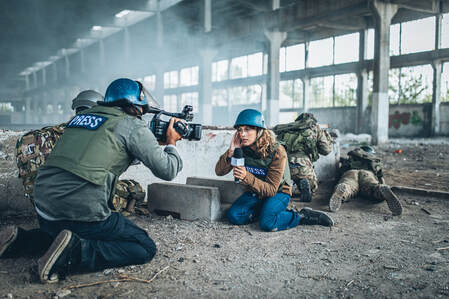Teaching

M13326 Political Campaigning in the US
Fall 2019, Level 3, 20 ECTS
This module focuses on the theory, science and practice of modern political campaigning in the US, in particular in presidential elections. We will delve into the strategic environment that political candidates manoeuvre throughout elections and discuss the campaign strategies that they employ. We will cover topics such as the power and limits of campaigns, the changing nature of campaigns, political advertising and microtargeting, issue marketing, appealing to emotions, visual framing, attacking the opponent (negative campaigning), (mis) information and social media, minority candidates running for office, televised election debates and election news coverage. The field of campaigning rests upon knowledge from various disciplines, such as political science, communication science, psychology, marketing and neuroscience. Throughout the course the 2016 presidential campaign features as prime example. This course is for students who wish to get a better understanding of political campaigns and for students who want to be part of a campaign team in the future.
Fall 2019, Level 3, 20 ECTS
This module focuses on the theory, science and practice of modern political campaigning in the US, in particular in presidential elections. We will delve into the strategic environment that political candidates manoeuvre throughout elections and discuss the campaign strategies that they employ. We will cover topics such as the power and limits of campaigns, the changing nature of campaigns, political advertising and microtargeting, issue marketing, appealing to emotions, visual framing, attacking the opponent (negative campaigning), (mis) information and social media, minority candidates running for office, televised election debates and election news coverage. The field of campaigning rests upon knowledge from various disciplines, such as political science, communication science, psychology, marketing and neuroscience. Throughout the course the 2016 presidential campaign features as prime example. This course is for students who wish to get a better understanding of political campaigns and for students who want to be part of a campaign team in the future.

M3105 Conflict and Media NEW!
Fall 2020, Level 3, 20 ECTS POSTPONED DUE TO COVID
This module is guided by the following questions: (1) What is the role of the media in international conflict?, (2) How do government and military decision makers use the media to shape public opinion in times of conflict?, (3) What are the opportunities and challenges of modern technology for conflict reporting? This module covers topics such as the functions of media in democracy, the role of media in foreign policy making, the history of war reporting, terrorism and the media, the securitization of the media, gender and war reporting, citizen journalism, embedded journalism, the role of misinformation in international conflict, the changing nature of “journalism” (see Bellingcat) and photojournalism of war. This module will discuss these topics from an academic and a practitioner’s perspective. This module is co-taught with Dr. Natalie Martin who is a former BBC journalist turned academic. Throughout the module, cases such as the Iraq War, MH17 plane crash in Ukraine and relations with Russia, the Arab Spring and the war against ISIS will be discussed.
In the fortnightly seminars, we will focus on the practical aspect of how technology is used in 21st century investigative journalism. We will discuss topics such as mobile journalism and livestreaming, drone journalism, visual analysis (verification using geo-location, satellite imagery and photographs), social media and crowdsourcing and data journalism. If possible, techniques will be demonstrated/used in class. If you are interested in knowing more about how media shapes public opinion and decision-making on (inter)national conflict and/or aim for a career in journalism, public relations or policy making this course is for you.
Fall 2020, Level 3, 20 ECTS POSTPONED DUE TO COVID
This module is guided by the following questions: (1) What is the role of the media in international conflict?, (2) How do government and military decision makers use the media to shape public opinion in times of conflict?, (3) What are the opportunities and challenges of modern technology for conflict reporting? This module covers topics such as the functions of media in democracy, the role of media in foreign policy making, the history of war reporting, terrorism and the media, the securitization of the media, gender and war reporting, citizen journalism, embedded journalism, the role of misinformation in international conflict, the changing nature of “journalism” (see Bellingcat) and photojournalism of war. This module will discuss these topics from an academic and a practitioner’s perspective. This module is co-taught with Dr. Natalie Martin who is a former BBC journalist turned academic. Throughout the module, cases such as the Iraq War, MH17 plane crash in Ukraine and relations with Russia, the Arab Spring and the war against ISIS will be discussed.
In the fortnightly seminars, we will focus on the practical aspect of how technology is used in 21st century investigative journalism. We will discuss topics such as mobile journalism and livestreaming, drone journalism, visual analysis (verification using geo-location, satellite imagery and photographs), social media and crowdsourcing and data journalism. If possible, techniques will be demonstrated/used in class. If you are interested in knowing more about how media shapes public opinion and decision-making on (inter)national conflict and/or aim for a career in journalism, public relations or policy making this course is for you.
M14320 Designing Political Enquiry
Fall 2019, Level 4, 20 ECTS
This module is designed to allow students to develop a critical understanding of the methodological issues involved in designing and undertaking research in the discipline of politics and international relations and to strengthen their ability to read and evaluate political science literature more generally. The module focuses on issues of research design. It exposes students to a broad range of methodological issues involved in designing, conducting and writing up research in areas of comparative politics, international relations, and public policy. Topics that are addressed in the module include issues involved in developing a research question, problems of conceptualisation, measurement, and strategies and approaches to causal theorising in large and small N research. The module is designed to help students to develop a feasible research proposal of their MA dissertation.
Fall 2019, Level 4, 20 ECTS
This module is designed to allow students to develop a critical understanding of the methodological issues involved in designing and undertaking research in the discipline of politics and international relations and to strengthen their ability to read and evaluate political science literature more generally. The module focuses on issues of research design. It exposes students to a broad range of methodological issues involved in designing, conducting and writing up research in areas of comparative politics, international relations, and public policy. Topics that are addressed in the module include issues involved in developing a research question, problems of conceptualisation, measurement, and strategies and approaches to causal theorising in large and small N research. The module is designed to help students to develop a feasible research proposal of their MA dissertation.
